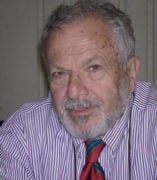
George Huppert
Professor Emeritus
History
Email:
About
George Huppert is the author of several books, including The Idea of Perfect History, as well as The Style of Paris and After the Black Death and Les Bourgeois Gentilshommes. He has published many articles in scholarly journals and he has served as the president of The Historical Society and as the editor of its journal. He has been a Guggenheim, Woodrow Wilson, NEH and ACLS Fellow, and served as a visiting professor at the College de France, in Paris.
Selected Publications
The Style of Paris: Renaissance Origins of the French Enlightenment (Bloomington: Indiana University Press, 1999).
The Idea of Perfect History: Historical Erudition and Historical Philosophy in Renaissance France(Urbana and Chicago: University of Illinois Press, 1970). French Edition: L’idee de l’histoire parfaite (Paris: Flammarion, 1973).
Les Bourgeois Gentilshommes: An Essay on the Definition of Elites in Renaissance France(Chicago: University of Chicago Press, 1977). Italian edition: Il borghese gentiluomo (Bologna: Il Mulino, 1978). French edition: Bourgeois et Gentilshommes (Paris: Flammarion, 1983).
Public Schools in Renaissance France (Urbana and Chicago: University of Illinois Press, 1984).
After the Black Death: A Social History of Early Modern Europe (Bloomington: Indiana University Press, 1986). Italian edition: Storia sociale dell’Europa nella prima età moderna (Bologna: Il Mulino, 1990). (Reprinted, American edition: 1992). Japanese edition (Asahi Shimbunsha Ltd., 1995).
“The Trojan Franks and Their Critics,” Studies in the Renaissance, XII (1965), 227-241.
“The Renaissance Background of Historicism,” History and Theory, V (1966), 48-60.
“Naissance de l’histoire de France,” Annales E.S.C. (1968), 60-105.
“La Liberté du cerveau,” in Melanges en l’honneur de Fernand Braudel (Toulouse, 1973), II, 267-277.
“The Idea of Civilization in the Sixteenth Century,” Studies in Honor of Hans Baron (Florence, 1974), 759-769.
“Divinatio et Eruditio,” History and Theory, XIII (1974), 191-207.
“Storia e scienze sociali,” in Il Mondo Contemporaneo, X, 2 (1983), 734-750.
“Classes Dangereuses,” in Les Reformes, ed. B. Chevalier and R. Sauzet (Tours, 1985), 271-278.
“Lucullus, Crassus and Cato in Grenoble,” Historical Reflections (spring, 1988), 271-278.
“Soziale Mobilitat in der Dauphiné im 16. Und 17. Jahrhundert,” in Winfried Schulze, ed., Standische Gesellschaft und Soziale Mobilitat. Schriften des Historischen Kollegs (Munich, 1988), 179-185.
“Ruined Schools: The End of the Renaissance System of Education in France,” in Humanism in Crisis, ed. Philippe Desan (Ann Arbor: University of Michigan Press, 1991), 55-67.
“Pasquier Philosophe,” in Etienne Pasquier et ses Recherches de la France (Paris: Presses de l’Ecole Normale Superieure, 1991), 121-129.
“Peter Ramus: The Humanist as Philosophe,” Modern Language Quarterly 51:2 (summer 1992), 208-223.
“Invisible Authorities,” History and Theory 33:2 (1994), 220-230.
“La rencontre de la philosophie et de l’histoire,” Le Corpus: Revue de Philosophie no. 28 (1995), 11-26.
“Antiquity Observed: A French Naturalist in The Aegean Sea in 1547,” International Journal of the Classical Tradition 2:2 (1995), 1-9.
“The Annales Experiment,” in The Routledge Companion to Historiography, ed. Michael Bentley (London: Routledge, 1996).
Reprint of “Divinatio et Eruditio,” originally published in History and Theory (1974), to be reprinted in a collection of articles about Michel Foucault (London:Routledge, 1995).
“The Age of Philosophy,” in Early Modern France, ed. David Rubin (Charlottesville: Rockwood Press, 1996), 16-28.
” A matter of quality: the Pasquier family between bourgeoisie and noblesse”, Historical Reflections, 27:2 (2001), 183-199.
” Under the shadow of Socrates” in The Classical Heritage in France, ed. Gerald Sandy ( Leiden, Brill, 2002), 281-295.
Notable Honors
1965-66, Fellowship, American Council of Learned Societies
1972-73, Fellowship, John Simon Guggenheim
1977-78, Fellowship, National Endowment for the Humanities
1982-83, Fellowship, Institute for the Humanities, UIC